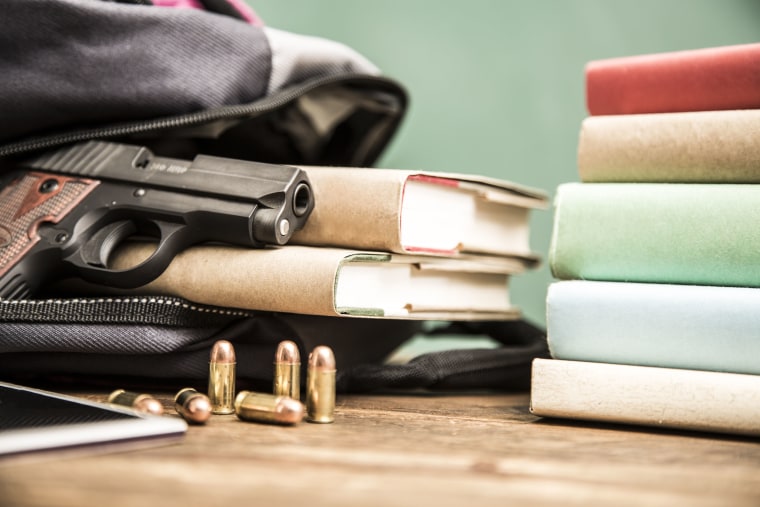The two recent mass shootings in Dayton, Ohio, and El Paso, Texas, have once again shocked people across the United States and reignited the debate over gun control.
And as school begins this year, other shootings — especially those that happened in schools in Parkland, Florida, and Newtown, Connecticut — still hang prominently in parents' minds. So much so that many are purchasing a new school "supply": bulletproof backpacks.
Several brands market different versions of the product, including Skyline USA and Bullet Blocker. Skyline USA founder and president Yasir Sheikh told CNBC that their backpacks have sold out several times this year; Bullet Blocker founder Joe Curran told CNBC that while they'd been marketing their backpacks since 2007 (following the Virginia Tech campus shooting), there's been an increase in sales in the past few years.
"Our sales of our backpacks and inserts have increased approximately 200 percent over the past year," Curran told CNBC. "During the back-to-school season, we sell many of our products to parents, teachers and college students."

While there are other brands out there, very few meet the minimum performance requirements set forth by the National Institute of Justice. Both brands are ranked at "Level IIIA," which means that the backpacks can stop bullets from a 9-millimeter handgun and a .44 Magnum. However, in several recent school shootings, different weapons — which are more powerful than the bullets the backpacks have been tested against — have been used.
Wendy Connor, a Florida-based parent of two children, bought backpacks for both of her kids after the Parkland shooting.
"I thought it might at least give them a chance in the event of a school shooting," she told TODAY Parents. However, the heavy weight of the backpacks made them difficult to carry. She said that she might be interested in re-purchasing if a better design were used.
"They were quite expensive, but I thought that was a small price to pay," Connor said. "Any chance we can give our kids is worth it."
Susana MacLean, a parent of two teenagers in New Jersey, was initially opposed to the idea of bulletproof backpacks, seeing them as a reaction to "distorted threat perceptions." But recently, gun violence hit close to home.
"A man was arrested, sitting in his SUV, parked in front of the entrance to one of my town's elementary schools this past June," MacLean said. "He had a Glock pistol and over 130 rounds of hollow point bullets. Right now, a bulletproof backpack doesn’t sound like such a bad idea. This s--- is real, and it can touch any of us."
David Schonfeld, a developmental pediatrician and the Director of the National Center for Crisis and Bereavement, said he is not certain backpacks may be as effective as people hope for them to be, but parents may find them reassuring.
"One thing we realized when we worked with schools, particularly when there's been a shooting in that school or in the community or even in another community, it makes people, parents in particular, feel very vulnerable about the safety of their children," Schonfeld said. "There's often this need to at least have an illusion of control. ... You can talk about whether it's logical or if that would even work, but somehow they need to believe that they're doing something that might work."
Some parents are questioning the practicality of bulletproof backpacks.
"Honestly, how many kids are actually carrying their backpacks when a shooter comes into a school?" asked Rachel Mandell VanDermark, who lives in Florida and has three children, including one high schooler and one college student. "Most kids drop their backpacks on the floor either near the door or at their desks. If a shooter enters the school they're going to lock the classroom door, hide, etc., and hopefully they won't be running around the open campus with a backpack on their back."
"I don’t think any person, adult or child, is going to have the time or clarity of thought to grab a backpack and uses it as a shield," said Jennifer Wharton, a mom of a 10-year-old and a 14-year-old in Los Angeles. "Ask the Parkland students or the Sandy Hook children. The backpacks are also extremely heavy and it would slow down anyone who is trying to take cover or run."
Schonfeld did echo Wharton and VanDermark's concerns about the backpacks not being accessible. He said he would be concerned about students trying to get their backpacks instead of sheltering in place or fleeing the area.
"It's not based on logic, it's based on fear," he said. "To be investing the money and resources into something that has limited efficacy, when there are other things that you could use that money for and that time for, it might not be a good decision."
Never miss a parenting story with the TODAY Parenting newsletter! Sign up here.
Other parents said that they wouldn't upset their children by insisting on using the bulletproof backpacks.
"The idea of handing [my 5-year-old] a backpack and explaining that he should use it to shield his body from bullets is beyond comprehension to me," said Mary Katherine Backstrom, a Florida-based TODAY Parenting Team contributor who also belongs to the group Moms Demand Action for Gun Sense in America. She said her son was first exposed to the idea of an active shooter during a drill when he was in preschool, and he became anxious for several months as a result.
"I will not do it. I send my son to school to learn and grow and thrive. I will not reinforce the notion that his learning space is a potential war zone," Backstrom said. "That fight must take place outside of the classroom, through legislation, and it's past time for adults [to] step up and handle this mess. I refuse to accept that this is what America has become."


